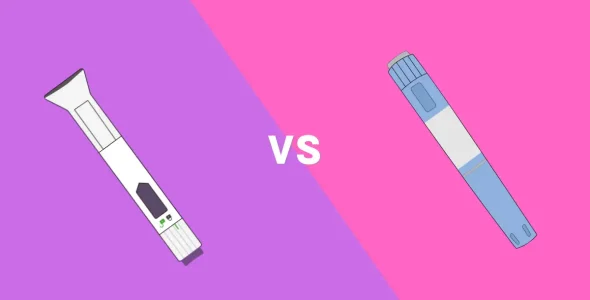How much weight can you lose on Mounjaro?
Key highlights
- Mounjaro (tirzepatide) is a prescription injectable medication FDA-approved for controlling blood sugar levels in adults with type 2 diabetes and is commonly prescribed off-label for weight loss.
- In clinical trials, people taking tirzepatide 10 mg weekly experienced an average of 21.4% (48.9 pounds) reduction in their body weight, and those taking 15 mg weekly lost an average of 22.5% (52 pounds) in their body weight.
- Factors like the strength of the maintenance dose, how long you take the medication, exercise, diet, stress, sleep, other medications, and other health conditions also influence how much weight you can lose.
- You can maximize the effect of tirzepatide for weight loss with a low-calorie diet, exercising regularly, improving the quality and duration of sleep, and reducing stress.
Mounjaro (tirzepatide) is an FDA-approved injectable medication for type 2 diabetes but is also used off-label for weight loss in people with obesity or overweight with at least 1 weight-related health condition. Tirzepatide has a half-life of 5 days and reaches a steady state in the body within 4-5 months. Your doctor will start with a low dose of the medication until you reach the required maintenance dose.
However, semaglutide weight loss medications (Wegovy and Ozempic) also work similarly to Mounjaro, making it hard to select the best medication for you and many people are wondering “How much weight can I lose on Mounjaro?”
Tirzepatide is more effective in weight loss than semaglutide. In a 72–week trial, the average weight loss was in the range of 16% (35.5 pounds) to 22.5% (52 pounds) of body weight.
Learn more about how much weight you can lose with Mounjaro, factors that influence weight loss while taking Mounjaro, and tips on how to maximize weight loss with this medication.
How much weight can you lose on Mounjaro?
It depends and varies by person.
The SURMOUNT-1 clinical trial studying the safety and efficacy of tirzepatide in weight loss showed that participants taking 5 mg weekly tirzepatide lost an average of 16% (35.5 pounds) of their body weight, those taking 10 mg weekly tirzepatide lost an average of 21.4% (48.9 pounds) of their body weight and those taking 15 mg weekly tirzepatide lost an average of 22.5% (52 pounds) of their body weight, compared to a 3.1% body weight reduction with the placebo.
Participants in the clinical trial also reduced an average of 5.5 to 7.3 inches from their waistlines, and reduced their body fat by 33.9%, compared to 8.2% with a placebo. Additionally, there were other improvements associated with the weight loss, including lower blood pressure and lower cholesterol.
The same trial showed that 80%-91% of the participants taking tirzepatide lost more than 5% of their weight. The tirzepatide group also showed improvements in cardiovascular and metabolic risk factors, including systolic and diastolic blood pressure, waist circumference, fasting insulin, lipid, and aspartate aminotransferase levels, compared to placebo.
Furthermore, Eli Lilly and Company’s SURMOUNT-2 trial showed a significant weight loss of up to 15.7% in adults with obesity or overweight and type 2 diabetes using tirzepatide.
The phase 3 SURMOUNT-3 clinical trial evaluated the efficacy of tirzepatide in adults with obesity or overweight with weight-related comorbidities, excluding type 2 diabetes. Results show that the participants achieved an average weight loss of 26.6% (64.4 pounds), whereas the participants on placebo lost 3.8% (9.0 pounds) on average over 84 weeks. The 72-week trial was conducted after 12 weeks of intensive lifestyle changes, including exercise, a low-calorie diet, and counseling sessions. The tirzepatide group received 2.5 mg weekly starting dose, increased to 10 mg or 15 mg weekly maintenance dose, depending on the participant’s maximum tolerance.
During the SURMOUNT-4 randomized clinical trial, participants received a once-weekly subcutaneous maximum tolerated dose (10 or 15 mg) of tirzepatide for 36 weeks and were randomized for the next 52 weeks. Half of the participants were switched to a placebo, whereas half of them continued to receive tirzepatide for up to 88 weeks. At the end of the trial, the overall mean body weight reduction from weeks 0 to 88 was 25.3% for tirzepatide and 9.9% for the placebo.
Although Mounjaro is not a weight loss drug, another drug with the same active ingredient, tirzepatide, sold under the brand name, Zepbound, is approved by the U.S. Food And Drug Administration for weight management in obesity and overweight. Learn more about Zepbound vs. Mounjaro.
Weight Loss Calculator
Is Ozempic or Mounjaro better for weight loss?
Another study showed that all three doses (5 mg, 10 mg, and 15 mg) of Mounjaro (tirzepatide) showed a higher change in weight from baseline at 40 weeks than Ozempic (semaglutide). Participants taking 5 mg experienced an 8.2% decrease (17 pounds), those taking 10 mg lost 10.0% (21 pounds), and 15 mg dose led to 11.8% (25 pounds) weight loss. In comparison, participants taking Ozempic 1 mg showed a mean weight change of 6.2% (13 pounds).
The survey studying semaglutide vs tirzepatide for weight loss in adults with obesity or overweight showed the superiority of tirzepatide (Mounjaro and Zepbound) over semaglutide (Wegovy and Ozempic). The on-treatment weight changes were higher in patients receiving tirzepatide at 3 months.
RELATED: Mounjaro vs. Ozempic
Do you have to stay on Mounjaro forever for weight loss?
It’s up to you. Research shows that people who remained on tirzepatide lost an additional 5% of their body weight and those on a placebo regained 14% of their weight over the next 52 weeks. Another study showed that people who stopped taking the drug regained around two-thirds of the weight they had lost.
How much weight can you lose in a month on Mounjaro?
Mounjaro’s manufacturer, Eli Lilly and Company, does not provide a specific amount of weight you can lose over time. However, different clinical trials and studies have shown the weight loss drug’s efficacy. According to data from randomized controlled trials, users may lose 4% of their body weight after one month and 6% of their body weight after two months, on average.
How much weight can you lose on Mounjaro in 3 months?
Eli Lilly does not provide a specific amount of weight loss in 3 months with tirzepatide. Typically weight loss medications help you shed at least 5% of your total body weight in the first 3 months. However, the loss of weight may depend on various factors, including diet and physical activity. Also, you must remember that tirzepatide has been seen to show maximum efficacy when combined with lifestyle changes like regular exercise and a healthy diet.
How does Mounjaro work?
Mounjaro (tirzepatide) is an FDA-approved prescription injectable medication for controlling blood sugar levels in adults with type 2 diabetes.
Tirzepatide, the active ingredient of Mounjaro, is the first and only approved single molecule that activates GIP and GLP-1 receptors in the body. This glucagon-like peptide-1 receptor (GLP-1) and glucose-dependent insulinotropic polypeptide (GIP) drug stimulates insulin secretion, improves insulin sensitivity, and decreases food intake. As it delays stomach emptying because of its GLP-1 agonist action, you feel fuller for a longer time and intake fewer calories.
Tirzepatide plays a notable role in weight loss in type 2 diabetes mellitus patients. A review study on the efficacy of tirzepatide concluded that it did not increase the risk of major cardiovascular events in participants with type 2 diabetes compared to the control group.
Tips for maximizing weight loss on Mounjaro
Although Mounjaro is not approved by the U.S. Food and Drug Administration for weight management, its weight-loss action has been supported by various clinical trials and studies. Mounjaro is commonly prescribed off-label for weight loss. To achieve maximum results while taking this medication, lifestyle changes are critical in ensuring that you lose body fat effectively.
Healthy diet
Mounjaro acts as a weight loss medication by activating the GLP-1 and GIP receptors to delay the transit time of food in the stomach, leading to a decreased appetite. A healthy diet is critical to ensure that you get all the nutrients. Healthcare professionals suggest eating a protein-rich diet when using Mounjaro to boost lean mass production. You should also avoid carbohydrates and fats, and eat a low-calorie diet that promotes weight loss. The use of alcohol is also not encouraged when taking weight loss medication, as it is a calorie-dense drink. Additionally, eating fried foods can also increase your risk of hypertension, weight gain, and obesity.
A clinical trial also observed that women should consume 1,200 calories per day and men should consume 1,500 calories per day when trying to lose weight.
Exercise
Physical activity including flexibility, aerobic, and resistance exercises can be helpful when taking weight loss medication like Mounjaro. Research shows that consistently exercising for more than 150 minutes per week may contribute to weight loss and weight maintenance efforts over the long term. It can also be beneficial for people with type 2 diabetes.
The effectiveness of Mounjaro as an adjunct to diet and exercise to improve glycemic control in adults with type 2 diabetes mellitus was established in five trials. Therefore, physical activity and regular exercise are critical to losing weight with Mounjaro.
Resistance training helps maintain healthy skin to prevent sagging and aging. Exercises like squats and step-ups can also help avoid “Ozempic butt” when taking GLP-1 receptor agonist medications like Mounjaro, Ozempic, Wegovy, and Zepbound.
Stress reduction
Your body releases cortisol under stressful conditions, which may also increase stress-related eating. Eventually, you might eat calorie-rich food high in carbs and fats, leading to weight gain.
Therefore, managing stress by planning ahead, limiting your contact with stressors, taking time to relax, and talking to your loved ones can help manage weight better when using Mounjaro. Additionally, meditation, progressive muscle relaxation, indulging in pleasurable activities, and cognitive behavioral therapy can also help reduce stress to promote weight loss.
If needed, consult a healthcare provider so they can suggest a suitable regimen to help you feel relaxed.
Better sleep
According to a study by JAMA Network, people who sleep less crave high-calorie foods and consume more calories. Another meta-analysis of studies found that the risk of obesity increased by 9% for each 1-hour decrease in sleep duration, compared to 7 hours of daily sleep.
A review of 31 cross-sectional studies showed that a decrease in sleep duration is linked to overweight and obesity. Moreover, research shows that poor bedtime habits also lead to weight gain. Maintaining better sleep can help manage weight better with Mounjaro by avoiding weight gain with unhealthy sleeping habits.
Factors that influence weight loss on Mounjaro
While research shows patients losing a significant amount of weight on using Mounjaro (tirzepatide), the weight changes may vary in different individuals because of various factors, like:
Time
Although Eli Lilly does not stipulate a specific amount of weight loss in a particular period, people typically start seeing changes in weight within a few weeks. In a trial supported by Eli Lilly, treatment with tirzepatide resulted in a significantly greater weight reduction than that with a placebo after 20 weeks of randomization.
Dose
The weight you lose with tirzepatide may depend on the weekly subcutaneous dose. Your healthcare practitioner will most likely start with a low dose of Mounjaro to avoid gastrointestinal side effects like constipation and nausea. In the same trial by Eli Lilly that studied the efficacy of tirzepatide, users taking 5 mg tirzepatide weekly lost 16.0% of their body weight, those taking 10 mg weekly lost 21.4% of their body weight, and those taking 15 mg weekly dose led to the most significant weight loss of 22.5% of their body weight, indicating that individuals with tolerance to higher doses had better results.
Diet
When taking weight loss medication, healthcare professionals suggest a low-calorie diet to promote weight loss. Increasing your protein intake and reducing carbs and fats in your diet is also suggested to prevent further weight gain.
A 1-year trial studied the benefits of lifestyle modification in the pharmacologic treatment of obesity. At the end of the trial, patients treated with the weight loss drug alone lost 4.1% of their body weight on average. At the same time, participants with lifestyle changes during pharmacological treatment of obesity lost 10.8% of their weight on average. Although reductions were seen in LDL and triglycerides, patients experienced high blood pressure (systolic and diastolic).
Exercise
Exercise is effective for weight loss in patients taking Mounjaro (tirzepatide). Data showed the effectiveness of Mounjaro as an adjunct to diet and exercise to improve glycemic control in adults with type 2 diabetes mellitus. Daily workouts, such as aerobic training and resistance training can help you lose weight faster compared to only taking the medicine.
Stress
Reports have shown a relationship between chronic stress, food cravings, and body mass index (BMI) as people tend to eat more when stressed. Indulging in activities that help you relieve stress can help improve weight loss with tirzepatide. You may also take medical advice from a healthcare provider to find the best-suited ways to manage stress better.
Sleep
Sleep quality and duration also contribute to weight loss and weight gain. Research shows disturbed sleeping patterns, in terms of both quantity and quality, have been seen to increase snacking, especially on foods rich in fat and carbohydrates, leading to weight gain.
In another study, participants who slept only 5.5 hours lost 55% less body fat and 60% more fat-free mass compared to participants who slept 8.5 hours per night. Also, better subjective sleep quality increased the likelihood of successful weight loss by 33%, as did sleeping more than 7 hours per night in a 6-month weight loss program for women.
Other health conditions
While weight loss medications have been proven helpful in individuals with obesity or overweight, some medical conditions may make it harder to lose weight. For example, women with PCOS might find it harder to lose weight because of hormonal imbalance.
Diabetes is another health condition that can make losing weight more challenging. People with diabetes usually take insulin to manage blood sugar levels, which may lead to weight gain. Furthermore, studies have shown greater lean mass loss and lower fat mass gain in insulin-resistant men without diabetes mellitus than in insulin-sensitive men.
Hypothyroidism, chronic stress, and depression may also contribute to weight gain when taking Mounjaro, eventually increasing how long it takes to lose weight with the medication.
Other medications
Due to an increased appetite from some medicines for other medical conditions, it might take longer to lose weight. Some drugs, like anticonvulsant medications, including valproate and carbamazepine may cause weight gain in patients. People using chronic corticoid therapy have also reported weight gain of up to 70%. Individuals taking insulin also often gain weight.
Furthermore, medical therapies for mood disorders, depression, and other psychiatric illnesses have been associated with sometimes very significant weight gain.
However, researchers have not found any clinically significant effect of oral drugs co-administered with any of the GLP1RAs.
Bottom line
Mounjaro (tirzepatide) is FDA-approved for type 2 diabetes but also prescribed off-label for weight loss because of its significant weight loss benefits as tirzepatide has shown efficacy and safety in weight loss in obese and overweight patients.
In clinical trials, participants lost an average of 15% to 22.5% of their body weight or 35.5 to 52 pounds while taking Mounjaro over a year and a half.
The amount of weight loss can vary by person and is influenced by various factors including time on the medication, strength of the dosage you are taking, diet, exercise, stress, sleep, other medical conditions, and other medications you are taking. You can maximize weight loss with Mounjaro by exercising regularly, eating a low-calorie and nutrition-rich diet, improving your quality and duration of sleep, and reducing stress.











